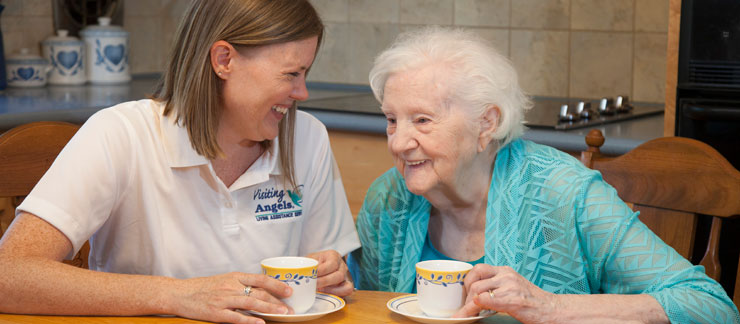Why Mom or Dad Could Use Seasonal Home Care
As the end of the year approaches, the holidays come in almost rapid secession: Halloween, Thanksgiving, Chanukah, Christmas, New Year, etc. For most of us, the holidays are a time for friends and family, but they are also often a time of year when we spread ourselves too thinly, overbook ourselves and generally put more pressure on ourselves than what’s probably necessary.
However, with an aging parent, that late-year holiday stress is compounded, and this is true for both adult children and their aging parents. Maybe, for now, Mom is still self-sufficient and can organize her routine and keep her house in order with minimal help from her family. However, this time of year can be busy, and she may need help staying on top of things. She has gifts to buy and wrap, family events to attend, social events to attend, meals to cook. Suddenly, her usual routine is hard to manage.
The season is just as busy for adult children too, and things can get complicated if your parent relies on family visits for company. The effects of socialization on senior health can’t be underestimated. Isolation can lead to problems including depression, health issues and cognitive decline. Thirty-three percent of people over 65 years old live alone, by the time a senior is 85 that number is 50 percent. Studies show that seniors are becoming more and more lonely, around 40 percent of seniors surveyed said they felt lonely. If your senior relies on your visits for social interaction, add that to the growing list of responsibilities you have this holiday season.
Help for Hard Times During Holidays
The American Association of Geriatric Psychiatry says that the holidays can be a difficult time for seniors. It can be a time of reflection when they miss loved ones who are no longer with them or even lost traditions. Seniors may also miss family living too far away and unable to travel. It’s natural to feel some "holiday blues," but it is essential to look out for the differences between that and full-blown depression.
One option to help Mom and her family who help her year-round is seasonal professional care. This understandably may seem like a drastic step: overall, Mom is fine, she’s not in need of permanent care at this stage of her life. It’s important to remember that professional care doesn’t have to be a full-time, round-the-clock endeavor. However, a caregiver could come around temporarily for the short time of the year when she needs a little extra help, and her family has a little less time to spend with her.
Consider the immediate benefits. A professional caregiver can help Mom with, not only holiday endeavors, but also everyday tasks; like cleaning, meal prep, driving or running errands. Think of the busy roads and malls during this time. A professional caregiver can help her navigate the chaos to shop and even help with gift-wrapping.
A particularly popular service during the holiday season is companion care. Whether Mom has less company because you are more occupied, or is lonely because she's missing Dad or other family or friends, having a professional caregiver to help pass the time, chat and keep her mind active, or even play a card game, could make a difference not only to her mental health, but her physical health, too.
Flexibility When It’s Needed Most
Seasonal home care is flexible. Simply talk to your aging parent about the times of day they need help with the most during the holiday season and a professional can visit your loved one as little or as often as she needs. Starting with eight hours of care per week will give Mom and the caregiver a real chance to bond. If this turns out to be too much, you can always scale back at a later date. It’s much easier to book too much and peel back than to try to organize more care if you find that what you’ve organized is not adequate for Mom.
It’s also important to remember that this seasonal care isn’t just for her. It could help get your entire family through a hectic time of year. Nobody wants to leave a parent or loved one alone during the holidays, but time is a limited resource, especially for adult children with a family of their own. Far too often, leaving Mom alone leaves adult children with feelings of guilt. Merely knowing that Mom is in good hands can let you make the most of the time that you spend apart.
Although Mom probably doesn’t need full-time right now, hiring seasonal care gives you a head start should her needs suddenly evolve. Having an existing relationship with a professional caregiver could make it so much easier for her to accept help when that time comes and will make that transition into regular home care easier.
For information on how to set up a new senior/caregiver relationship for success, read this article.













